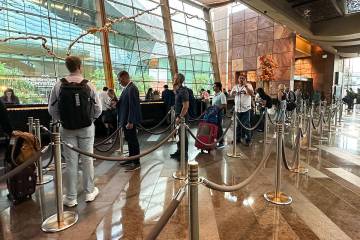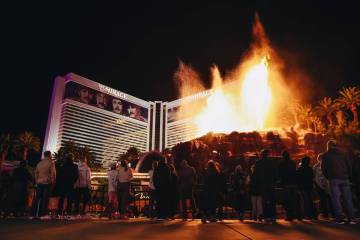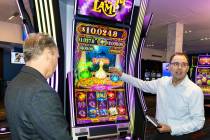Gaming sees opportunity in Japan Olympics
The gaming industry is ready to climb Japan’s Mount Fuji.
Last week’s award of the 2020 Summer Olympic Games to Tokyo ignited more than the Olympic torch in the Japanese capital. The gaming industry hailed the announcement as the road to legalized casinos in Asia’s largest untapped gaming market.
After all, Japan has to find a means to pay for an estimated $1.53 billion in Olympic venues before the world’s athletes descend upon Tokyo.
Two large-scale resorts — one each in Tokyo and Osaka — could be worth $10 billion in annual gaming revenues, said Union Gaming Group Principal Grant Govertsen. Those figures would surpass not only the Strip ($6.2 billion in revenues in 2012) but all of Nevada, which produced $10.86 billion in gaming revenues last year.
Casino operators could be taxed as much 10 percent nationally on gross gaming revenues and also pay local fees and licensing costs.
“We think the government should consider integrated resort development, at least in Tokyo, as a means to help the related Olympics infrastructure come to fruition,” Govertsen told investors the day after the announcement.
Nevada’s largest casino operators flew to Japan to scout potential gaming locations soon after news of the Olympics broke.
Las Vegas Sands Corp., which has developed gaming resorts in Macau and Singapore and plans a massive complex for Spain, is scouting sites on reclaimed land in Tokyo Bay, a Bloomberg News report stated. MGM Resorts International, Caesars Entertainment Corp. and two Macau casino operators, SJM and Melco Crown Entertainment, are also in the Japan mix.
MGM Resorts Executive Vice President Alan Feldman said his company has been looking at Japan for the past 18 to 24 months, monitoring the prospective legislation and meeting with possible partners.
“Japan represents an historic opportunity for tourism expansion in a country with an incredibly rich cultural heritage,” Feldman said. “Tokyo is in an extraordinary position to re-energize the entire country’s tourism and entertainment industry.”
Govertsen handicapped Las Vegas Sands and Malaysia-based Genting Group — which is developing the $2 billion Resorts World Las Vegas — as early front-runners. The companies are earning accolades for operating both destination resorts in Singapore, the world’s third- largest gaming-revenue- producing market behind Macau and Las Vegas.
But all this talk is just speculation. Asian markets such as Sri Lanka, the Philippines and Vietnam are further along on casino expansion.
Union Gaming predicted in past research reports that winning an Olympics bid could be a catalyst to legalizing casinos in Japan, a country that in the past has shunned pro-gaming legislation.
What’s changed is the makeup of the government and the mood of the country, especially after the 2011 earthquake and tsunami devastated portions of northern Japan. A member of Japan’s ruling party in the National Diet — the country’s version of Congress — heads a group promoting casino legislation. Prime Minister Shinzo Abe, who took office in December, is also viewed as favoring casinos.
Govertsen speculated that the prime minister’s economic platform includes the development of integrated resorts — hotel-casinos that include convention facilities, fine dining, shops and other entertainment amenities — in conjunction with the Olympics. Tokyo’s Olympic bid committee estimates the games would have an economic impact of nearly $30 billion and create 15,000 jobs.
The timing of the Olympics announcement couldn’t have been better for Union Gaming.
The Las Vegas-based company is hosting a three-day conference starting Monday at the Conrad Hotel in Tokyo that focuses on Japan’s potential expansion into legalized casino gaming. The event will gather government officials, gaming company representatives and investors in one room.
“We’re creating a platform that is bringing together all parties for communication and education,” Union Gaming Managing Director Bill Lerner said. “There is a huge education gap, and we believe this conference will help an industry improve from a structural perspective.”
Scheduled speakers include George Tanasijevich, CEO of Singapore’s Marina Bay Sands; MGM Resorts President Bill Hornbuckle; Wynn Resorts Development President Gamel Aziz; and several Japanese government advisers.
“From a regulatory and geographical perspective, we’re putting all the pieces together in one place,” Lerner said.
Credit Suisse gaming analyst Joel Simkins termed the Tokyo Olympics announcement a positive, long-term catalyst but also told investors not to get their hopes up.
When soccer’s 2014 World Cup and the 2016 Summer Olympics were awarded to Rio de Janeiro, Simkins said he thought Brazil’s government would legalize casinos to help cover the bills.
“This has not been the case and could be a template for what to expect in Japan,” Simkins told investors. “While landing the Olympics is a net positive for the prospects of integrated resort gaming in Japan, keep in mind that managing developments for the games, as well as rolling out integrated resorts, would make for a very full plate, particularly for the various political parties.”
Analysts said the Japanese gaming landscape could be a moving target. The market could include two smaller resorts in addition to large-scale projects in Tokyo and Osaka.
Even if casinos are legalized in the next legislative session, the site selection and bidding process could reach into 2015 or even 2016. The earliest resort opening could be 2019.
“In the case of Tokyo, we think there would be significant government support to complete an integrated resort in time for the opening of 2020 Olympics,” Govertsen said.
Howard Stutz’s Inside Gaming column appears Sundays. He can be reached at hstutz@reviewjournal.com or 702-477-3871. Follow @howardstutz on Twitter.






















